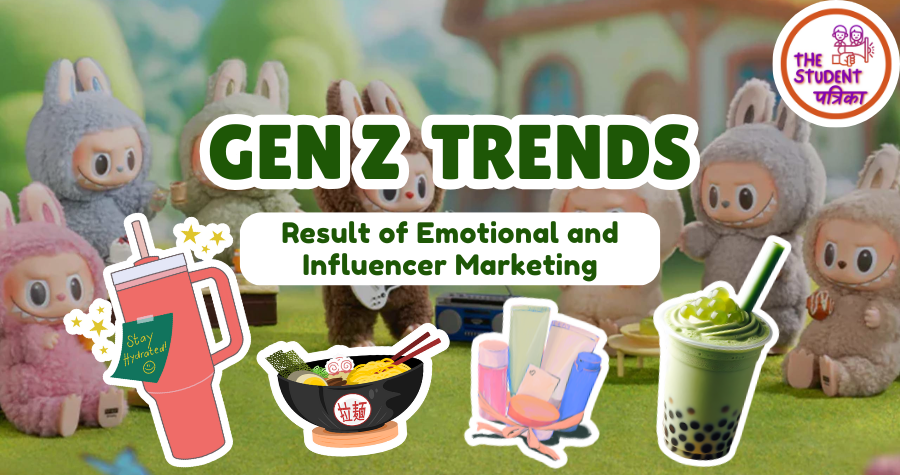
From matcha lattes and Labubu dolls to K-beauty, solo travel, and Stanley tumblers, social media is redefining what young people want—and how quickly they want it. What used to be occasional indulgences have turned into viral trends that often lose meaning the moment the next one hits the feed.
This blog takes a closer look at the growing influence of emotional and influencer marketing on Gen Z trends, and how these marketing strategies affect financial decisions, identity, and mental well-being.
The Rise of Short-Lived Obsessions: Understanding the Hype
In recent years, products like Labubu dolls—collectible figures priced at thousands of rupees—have seen massive demand among Indian teens and young adults. Similarly, Stanley Cups, once a basic water bottle, have turned into status symbols promoted by social media influencers worldwide.
Even Matcha, a traditional Japanese green tea, is now branded as a premium skin-clearing beverage. These trends don’t just happen organically; they are often triggered by targeted digital marketing campaigns that thrive on aesthetic appeal, limited editions, and FOMO (Fear of Missing Out).
Emotional Marketing: Selling a Lifestyle, Not Just a Product
Emotional marketing plays a major role in this transformation. Brands today don’t just advertise what their product does—they sell what it means. A Stanley Cup, for instance, is not advertised just as a tumbler, but as part of an “organized, clean-girl, health-conscious lifestyle.” A skincare routine is no longer about self-care alone—it’s positioned as a path to personal transformation, success, and even social validation.
For young people still shaping their sense of self, these emotional appeals can be powerful. They create an illusion that buying a product brings confidence, social approval, or peace of mind.
Influencer Marketing: The New Word of Mouth
The backbone of most Gen Z trends today is influencer marketing. Whether it’s through long-form YouTube videos or short Instagram Reels, influencers have emerged as trusted voices for fashion, food, travel, and skincare. Many of them subtly (or explicitly) promote products that are sponsored, affiliate-based, or PR sent—without clear disclaimers.
This often gives the impression that they genuinely use or believe in these products. However, many trends disappear as quickly as they arrive, once the influencer has moved on to promoting the next product.
The Impact: Identity, Finances, and Mental Health
Young consumers are particularly vulnerable because these marketing tactics tap into two core human emotions—insecurity and aspiration. When a teen or college student sees their favorite influencer using a designer perfume or traveling solo to Bali, it sparks a sense of inadequacy and comparison. This leads to:
-
Over-spending on non-essentials
-
Chronic dissatisfaction with what one has
-
Shifting identity based on consumption
-
Financial stress, especially among students
-
Lower self-esteem due to social comparison
Most of the time, the gratification is short-lived. A skincare product may not deliver magical results. A doll may lose its charm in a few weeks. But the emotional void it aimed to fill still remains.
What Can Be Done?
-
Media Literacy in Schools and Colleges
Young people must be educated to recognize marketing tactics and distinguish between real reviews and paid promotions. -
Mindful Consumption
Ask questions like: “Do I really need this?” or “Am I buying this for myself or for how I’ll look online?” -
Transparency in Influencer Partnerships
Influencers must clearly label paid promotions and affiliate links. Viewers must also understand that curated content often does not reflect reality. -
Digital Detox and Balance
Taking regular breaks from social media can help reduce impulsive buying and help reconnect with real needs.
Today’s youth are constantly navigating a digital world full of trends that tell them who to be, how to live, and what to buy. While many of these trends are harmless or even fun, unchecked emotional and influencer marketing can lead to financial pressure and identity confusion.
By being more aware, asking the right questions, and choosing mindfully, Gen Z can take back control over their choices—both online and offline.
Stay tuned to StudentPatrika.com for more deeper analyses, and expert insights!










